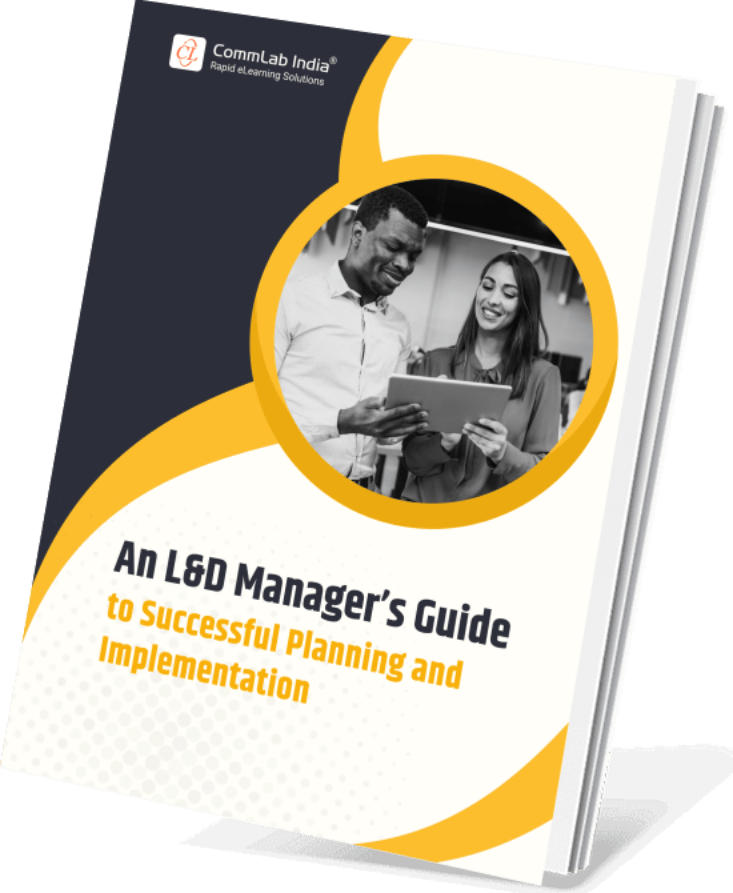8 Must-Read Books for L&D Professionals

Continuous learning and development are essential for achieving success both personally and professionally. Choosing the right resources to guide and inspire this journey can make a significant impact. Whether you're a corporate trainer, an instructional designer, or simply someone dedicated to personal growth, selecting books that offer deep insights into creating effective learning environments, cultivating productive habits, and preparing for the evolving L&D trends can be incredibly valuable.
Time to Put on Your Reading Glasses!
Here are Some Must Reads for You:
- Atomic Habits by James Clear
- Workplace Learning by Nigel Paine
- Design Thinking by Sharon Boller & Laura Fletcher
- Long Life Learning by Michelle Weise
→ Download eBook: An L&D Manager’s Guide to Successful Planning and Implementation
Here’s an overview of eight must-read books that promise to enrich your approach to learning and development. These books provide a wealth of knowledge on various aspects of personal and professional growth, from strategies for enhancing workplace training programs to techniques for self-improvement. By exploring these resources, you can gain new perspectives, refine your skills, and stay ahead in competition.
Table of Content
8 Must Read Books for L&D Pros:
- Atomic Habits: An Easy & Proven Way to Build Good Habits & Break Bad Ones by James Clear
- Workplace Learning: How to Build a Culture of Continuous Employee Development by Nigel Paine
- Design Thinking for Training and Development by Sharon Boller & Laura Fletcher
- Long Life Learning: Preparing for Jobs That Don’t Even Exist Yet by Michelle Weise
- Play to Learn: Everything You Need to Know About Designing Effective Learning Games by Sharon Boller & Karl Kapp
- Design for How People Learn by Julie Dirksen
- LMS Success: A Step-by-Step Guide to Learning Management System Administration by Katrina Baker
- Minds at Work: Managing for Success in the Knowledge Economy by David Grebow and Stephen J. Gill
8 Must Read Books for L&D Pros
1. Atomic Habits: An Easy & Proven Way to Build Good Habits & Break Bad Ones by James Clear
James Clear’s "Atomic Habits" is more than just a book on habit formation; it’s a blueprint for personal transformation. Clear argues that small, incremental changes lead to significant, long-term results. By focusing on tiny habits and the compound growth they bring, Clear provides a practical framework for building good habits and breaking bad ones.
Clear’s approach is rooted in the concept that habits are the compound interest of self-improvement. The book is divided into four fundamental principles: making it obvious, making it attractive, making it easy, and making it satisfying. Clear emphasizes the importance of environment design and identity change in developing sustainable habits. For anyone involved in learning and development, this book offers strategies for instilling effective practices in learners and fostering environments that promote continuous improvement.
An L&D Manager’s Guide to Successful Planning and Implementation
2. Workplace Learning: How to Build a Culture of Continuous Employee Development by Nigel Paine
Nigel Paine’s "Workplace Learning" addresses the evolving landscape of employee development and the role of learning cultures in organizations. Paine argues that a successful learning culture is one where learning is embedded in everyday activities and where employees are motivated to pursue continuous development.
The book explores various strategies for creating a learning organization, including leadership's role, the importance of aligning learning with business goals, and leveraging technology. Paine’s insights are particularly valuable for HR professionals, L&D managers, and organizational leaders aiming to enhance their company's learning environment. The emphasis on a systemic approach to learning ensures that development is not a one-off event but a continuous process embedded into the organizational fabric.

3. Design Thinking for Training and Development by Sharon Boller & Laura Fletcher
"Design Thinking for Training and Development" by Sharon Boller and Laura Fletcher offers a fresh perspective on creating impactful learning experiences. This book introduces design thinking as a method for developing training programs that are not only innovative but also effective and engaging.
Boller and Fletcher guide readers through the design thinking process, which includes empathizing with learners, defining problems, ideating solutions, prototyping, and testing. They provide practical tools and case studies that demonstrate how to apply these principles to training and development. This book is ideal for instructional designers and trainers who want to create learner-centered experiences that drive meaningful results.

An L&D Manager's Guide to Successful Planning & Implementation.
Learn:
- What Challenges do L&D Managers Face?
- How to Align Business and Project?
- How to be a Learning Consultancy?
- DOWNLOAD NOW!
4. Long Life Learning: Preparing for Jobs That Don’t Even Exist Yet by Michelle Weise
In "Long Life Learning," Michelle Weise explores the future of work and the necessity for continuous learning to keep pace with rapid technological advancements. Weise argues that traditional training and training methods are insufficient for preparing individuals for future job markets where roles and skills are constantly changing.
The book emphasizes the need for lifelong learning and adaptability, offering strategies for developing skills that will be relevant in the face of future disruptions. Weise provides insights into how individuals and organizations can proactively engage in learning to stay ahead of emerging trends. This book is a crucial read for anyone interested in future-proofing their career or organization in an era of constant change.
5. Play to Learn: Everything You Need to Know About Designing Effective Learning Games by Sharon Boller & Karl Kapp
"Play to Learn" by Sharon Boller and Karl Kapp is a comprehensive guide to designing learning games that are both educational and engaging. The authors argue that games can be powerful tools for learning, capable of enhancing motivation, retention, and application of knowledge.
The book covers the principles of game design, including how to create meaningful content, build engaging mechanics, and align games with learning objectives. It also includes practical examples and case studies that demonstrate the effectiveness of learning games in various contexts. For those involved in game design or looking to incorporate game-based learning into their programs, this book provides valuable insights and practical advice.

6. Design for How People Learn by Julie Dirksen
Julie Dirksen’s "Design for How People Learn" is a must-read for anyone involved in instructional design and e-learning. Dirksen delves into the cognitive science behind learning and provides practical strategies for designing effective learning experiences.
The book covers essential topics such as understanding how people process information, the role of motivation in learning, and techniques for designing content that enhances retention and application. Dirksen’s clear, accessible writing and practical advice make this book an invaluable resource for instructional designers and trainers seeking to create impactful learning materials.
7. LMS Success: A Step-by-Step Guide to Learning Management System Administration by Katrina Baker
Katrina Baker’s "LMS Success" is an essential guide for anyone involved in the administration of Learning Management Systems (LMS). Baker offers a step-by-step approach to managing and optimizing LMS platforms, which are crucial for delivering online learning and training.
The book covers a wide range of topics, including system setup, user management, course creation, and reporting. Baker provides practical tips and best practices for ensuring that LMS platforms are used effectively to support organizational learning objectives. This book is a valuable resource for LMS administrators, instructional designers, and anyone responsible for managing online learning environments.
8. Minds at Work: Managing for Success in the Knowledge Economy by David Grebow and Stephen J. Gill
"Minds at Work" by David Grebow and Stephen J. Gill explores the dynamics of managing in the knowledge economy, where intellectual capital and continuous learning are key to success. The book focuses on how to effectively manage and leverage the skills and knowledge of employees in a rapidly changing work environment.
Grebow and Gill discuss strategies for fostering a culture of learning, encouraging innovation, and managing diverse talent. They provide insights into how organizations can adapt to the demands of the knowledge economy and create environments where employees can thrive. This book is particularly useful for managers and leaders who want to harness the full potential of their teams and drive organizational success through effective knowledge management.
Conclusion
While learning and development is continually evolving, hence staying ahead of the latest theories, methods, and tools is crucial for anyone involved in training and development. The eight books highlighted here offer a wealth of knowledge and practical strategies that can help you navigate this dynamic field. Whether you're interested in habit formation, creating a learning culture, designing engaging educational experiences, or preparing for the future of work, these resources provide valuable insights and actionable advice.
Incorporating the principles and strategies from these books into your learning and development practices can enhance your effectiveness, improve outcomes, and foster a culture of continuous growth. As the world of work and learning continues to transform, these must-read books serve as essential guides for anyone committed to driving success and innovation in their field.
Here is a handy guide for present and future L&D managers on the successful planning and implementation of anything L&D.





